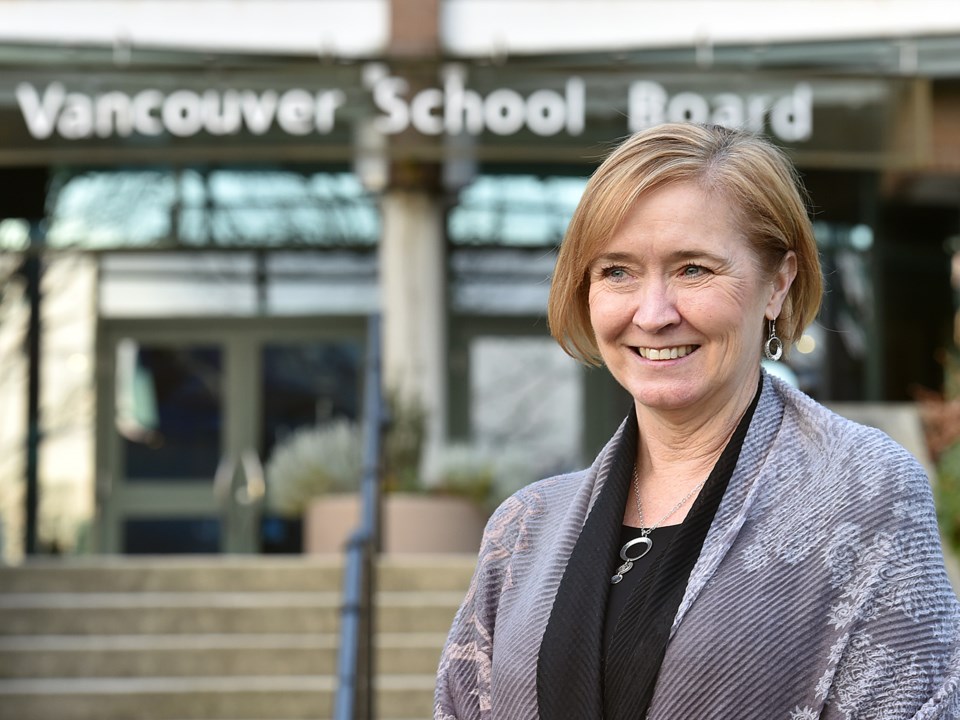There’s a new boss at the Vancouver School Board and she’s hoping to make it into a “magnet district” that draws in people who “could just die to be a teacher here.”
Suzanne Hoffman took over as VSB superintendent on Jan. 8 and is the first woman to fill the job. Before that, she worked at the Ministry of Education as the province’s chief educator, after serving as superintendent of the Langley school district.
She lives in Langley with her husband. They have two children, a son, 23, who is in business school, and a daughter, 21, who is in nursing school. Both of the kids and Hoffman herself were educated in public schools. Hoffman grew up in Richmond, where she attended Byng, Boyd and Steveston schools.
Her vision of Vancouver as a highly desirable district to work in will take some work — today there is a shortage of teachers on call and dozens of unfilled teaching positions. A recent report to the board shows 323 teachers have retired or resigned in the past two years and more than 100 teachers on call have left the district in the past year.
Hoffman replaces Scott Robinson, who left in October 2016 during a tumultuous time for the VSB — the board had refused to pass a balanced budget, there were accusations of bullying by trustees and a school closure process was underway. Robinson and several other senior managers went on simultaneous medical leaves, the board was fired and the school closure process was put on hold.
But now, with a new board of trustees in place, a new superintendent ready to go and all but one of the senior management team in place, Hoffman wants to turn the narrative around.
“In getting to know this place in the short time I’ve been here, there are extraordinary things happening with kids,” she said. “Teachers are doing amazing things and kids are having fabulous opportunities.
“I think a big part of my work is going to be making this a place that people are drawn to — they see it as a vibrant, diverse city… that people are proud to be a part of.”
She has spent her first two weeks meeting with and listening to the various partner groups of VSB, and she has seen no signs of any bullying, by anyone she has encountered thus far.
She says Langley schools share commonalities with Vancouver schools. As in Vancouver, some of Langley’s schools are full-to-bursting, while others have excess space. The ones on the Surrey border tend to be full, while the more rural schools have fewer students, Hoffman said. But one major challenge differs between the two districts: Langley’s enrolment is growing, while Vancouver’s is declining. Vancouver’s school population has dropped nearly eight per cent in the past five years, while Langley’s has grown by a similar ratio, provincial reports show.
While school closures are not on the immediate agenda at VSB, there is still excess space in some schools and a pressing need for seismic upgrades of more than 50 schools.
“It is one big, complicated, interconnected puzzle,” Hoffman said. “You need some pieces to fall into place before you can begin to solve it… Parents are concerned about the safety of their kids in schools… so there is an urgency around it, but you have to get it right.”
VSB’s finances are often challenging, and this year promises to be no different. The VSB’s five-year business plan shows a structural deficit of $3.76 million for next year that grows to $10.31 million by 2021. Hoffman has one ace in her corner as far as that goes — she already knows and trusts the VSB’s secretary-treasurer David Green. The pair previously worked together in Langley.
So far, she appreciates the diversity of voices that are involved in the VSB.
“They care. The partner groups all care deeply about this place,” Hoffman said.
One thing Hoffman seems to care deeply about is educational outcomes for the most vulnerable children, such as children in government care and Indigenous children — both groups that have lower graduation rates than most children. She says principals need to know who the vulnerable kids are in their schools.
“If you don’t know who they are, how are you going to look out for them? How are you going to make sure they’re coming to school?” Hoffman asks. “It really upsets me that there are kids out there who are falling through the cracks.”
The new boss has a strong vision; let’s hope she can see it through.
Tracy Sherlock writes about education and social issues. Contact her at [email protected].



